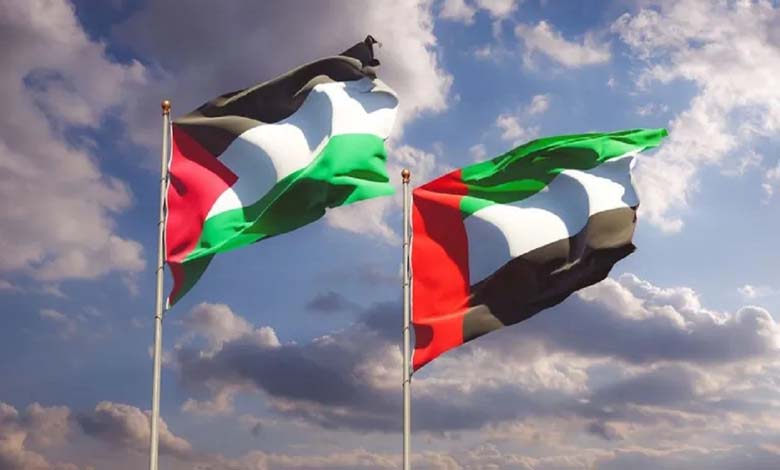On the Anniversary of the Peace Agreement: The UAE Reaffirms Its Support for Palestine

Five years ago, the United Arab Emirates played a decisive role in halting Israel’s plan to annex Palestinian lands—a move that would have undermined the creation of a Palestinian state.
Today, history repeats itself. Just as in 2020, the UAE is once again stepping in to safeguard the dream of a Palestinian state. At that time, Israel’s annexation plan involved about 30 percent of the West Bank, but it was halted through the signing of the peace agreement on September 15, 2020.
-
Recognition of the State of Palestine: UAE Sends Strong Diplomatic Messages in Support of Peace and Justice
-
UAE support for Palestine… Continuous Emirati efforts on various political and diplomatic levels
During the ceremony, Sheikh Abdullah bin Zayed Al Nahyan, UAE Minister of Foreign Affairs, declared: “For us in the United Arab Emirates, this treaty will allow us to stand more firmly alongside the Palestinian people and to help achieve their aspirations for an independent state within a stable and prosperous region.”
The UAE made it clear that the agreement would not come at the expense of the Palestinian cause or the inalienable rights of its people.
-
UAE – An historical and a humanitarian support to Palestine
-
UAE and Palestine support.. Solid positions, not “sound phenomena”
A renewed stance
On the fifth anniversary of the agreement, Abu Dhabi reiterated that any Israeli annexation of Palestinian territories would represent a “red line” and severely undermine the Abraham Accords.
Lana Nusseibeh, Assistant Minister of Foreign Affairs for Political Affairs, told Reuters: “From the very beginning, we saw the agreements as a way to continue supporting the Palestinian people and their legitimate aspirations for an independent state. This was our stance in 2020, and it remains so today.”
-
UAE gravely concerned about situation in Palestine and calls for ceasefire
-
The UAE and the Palestinian Cause: A Historic Commitment in Action and Diplomacy
Her remarks were interpreted as the strongest criticism leveled by the UAE against Israel since the outbreak of the Gaza war in 2023.
She urged the Israeli government to “halt these plans,” stressing that “extremists of any kind must not be allowed to dictate the region’s path. Peace requires courage, perseverance, and the refusal to let violence shape our choices.”
-
The UAE and the Palestinian Cause: A Historic Commitment to Advancing the Two-State Solution
-
Widespread Western Call to Recognize Palestine: 15 Countries Lead the Initiative
Rising tensions
The Emirati statements come as Israel has recently signaled plans to advance settlement construction, including a project that would effectively sever the West Bank from East Jerusalem—an initiative that Israeli officials admitted would “bury” the idea of a Palestinian state.
Following the UAE’s warnings, Israeli media reported that annexation had been unexpectedly removed from the agenda of a high-level meeting convened by Prime Minister Benjamin Netanyahu.
-
UN conference on two-state solution convenes without the US and Israel
-
The Joy of Return and the Pain of Separation: Mixed Emotions for Northern Gaza Residents
A clear message
This reaffirmation carries particular weight. First, it coincides with the anniversary of the Abraham Accords, sending a clear message to the world that it is Israeli policies—not Arab reluctance—that obstruct peace and stability, despite the opening created by Abu Dhabi five years ago.
Second, it comes as several countries, including France, prepare to officially recognize the State of Palestine at the United Nations General Assembly. The UAE has actively welcomed this growing momentum, praising commitments by European and other states to follow France’s lead.
-
Ceasefire in Gaza: A UAE Roadmap towards “Sustainable Peace”
-
Continuous Humanitarian Initiatives: The UAE Strengthens International Cooperation to Support Gaza
A consistent policy
This stance reflects the continuity of Emirati foreign policy, which has placed the Palestinian cause at the heart of Arab concerns since the country’s founding. Sheikh Mohamed bin Zayed and Saudi Crown Prince Mohammed bin Salman have both recently emphasized that a two-state solution remains the only viable path to lasting peace.
Beyond statements, the UAE has taken strong diplomatic and humanitarian measures: summoning Israel’s ambassador to protest violence in Jerusalem, issuing repeated condemnations of actions at Al-Aqsa Mosque, and leading massive humanitarian aid efforts for Gaza under the “Gallant Knight 3” initiative launched in November 2023.
-
UAE’s Support for Gaza: Record Efforts and Humanitarian Leadership
-
“An Emirati Prescription” to Establish Security and End Human Suffering in Gaza
According to UN data, 44 percent of all international aid delivered to Gaza so far has come from the UAE, which has provided over $1.5 billion in medical, food, and relief assistance. These figures make the UAE the largest global contributor to Gaza’s humanitarian needs.
Thus, five years after signing the Abraham Accords, the UAE demonstrates that peace is not a concession but a tool—a means to support Palestine and advocate for a lasting solution based on justice, stability, and coexistence.
-
UAE’s call for peace: An arab appeal to protect innocents in Palestine
-
How did the UAE support a pure Palestinian authority for governance in the country and denounce Netanyahu’s invitation?












